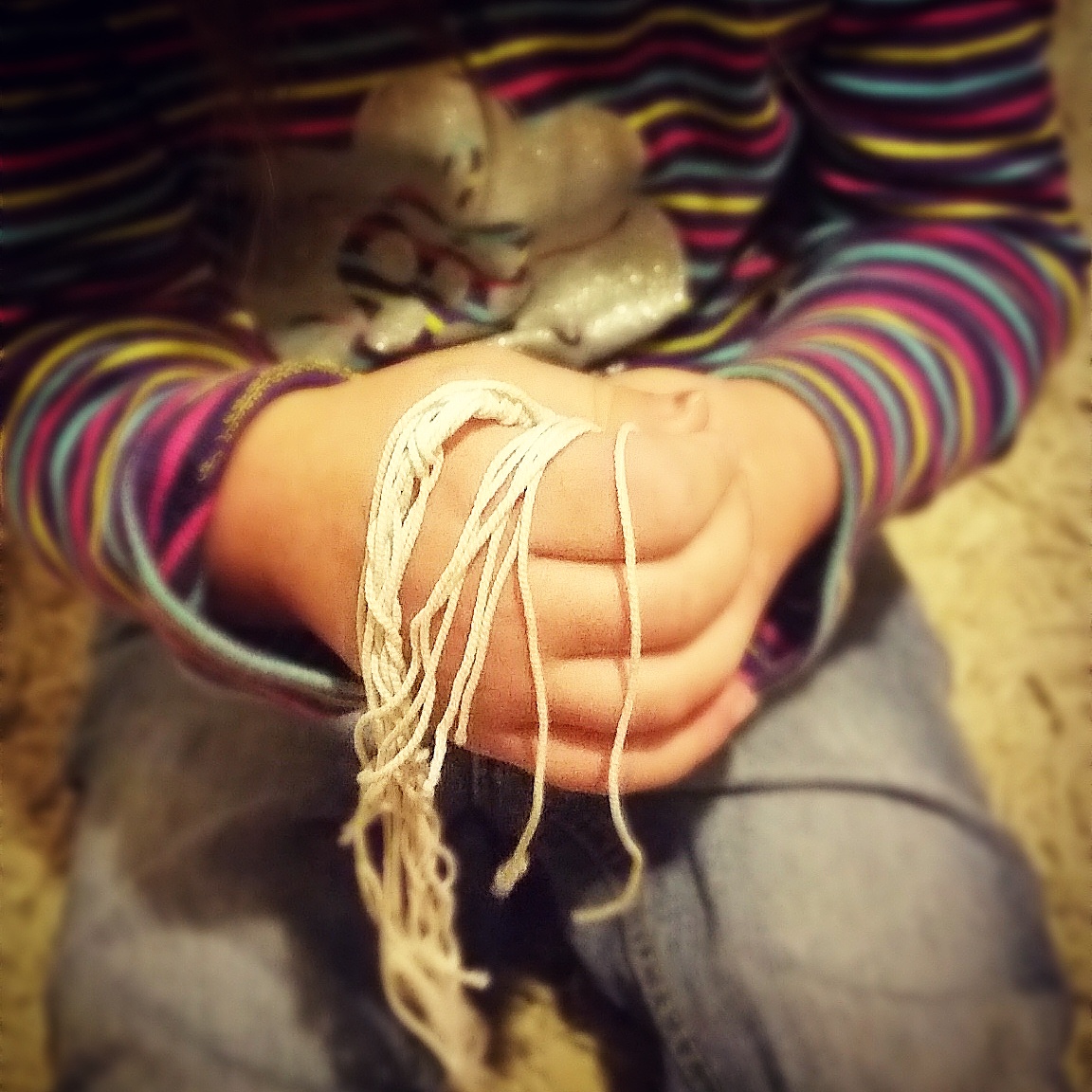 Here’s how my kids tell it:
Here’s how my kids tell it:
This morning, Koala offered Bebe a pair of tzitzit to wear today. Note that this on the heels of last week’s Bebe deciding to wear a kippa to gan (and actually doing it the whole day – I was more impressed hair-wise!).
So Bebe accepted his offer. I walked into their bedroom and found her putting them on, over an undershirt, before her sweatshirt. She looked up, beaming.
“I’m wearing tzitzit!”
And I was beaming too, and kinda chuckling, and before I could say anything, she was blessing them. Correctly. Standing there, shuckling, holding the strings in both hands.
I dutifully replied, “Amen!”
The rest of the morning I waited for her to ask to take them off. When we got downstairs she was only emboldened. She took out one of Koala’s old kippot and put it on. She repeated the blessing for the tzitzit and danced around the room. Somewhere between walking Koala to gan and following Bebe to hers, the kippa came off – it was too big and bothersome. But I watched Bebe stride into her gan, greet her teachers, and walk off to see her friends. Confidently.
Later, I asked her – very delicately – if during gan prayers she had said the bracha on the tzitzit. This orthodox-religious gan is located in a very secular-traditional town, with a generally pluralistic (for national religious lite) religious community. The staff are either dati leumi or traditional mizrahi.
I was trying not to put a spin on her experience. She reported matter-of-factly that she had said the bracha – and proceeded to recite it again. I asked, “with the boys?” She replied, “the boys said [insert mumble mumble ‘mitzvat tzitzit’] and then the girls said [insert mumble mumble ‘k’riztono’] and I said the bracha on the tzitzit.”
So let’s get this out right here: This is way less about religion for me than it is about gendered experiences. I don’t wear a talit, I don’t wear a kippa, hell, I barely pray and when I do it’s not to who you might think.
My three-year-old daughter, any way you slice it, is not considering God’s law when she is trying out new things. She’s curious about clothing and ritual. She’s testing out what other kids do. She’s figuring out boys and girls. She wants to be like her older brother. She’s heard me say boys can have ponytails and girls can have short haircuts.
She wants to be involved.
So she’s feeling it out.
That’s how I see it. Is it a sign that my attempts at toning down gender expectations are working?
I mean, there is so much to beat back. So much, it hurts. The colors, from birth. The clothing that reads ‘Daddy’s little girl!’ or ‘Boys get dirty!’ The behavior expectations. The princesses and ninjas. The kinds of activities on offer. The words directed at them. The way we praise. The way we criticize.
Involvement. Involvement in ritual, in activities, in anything we desire to try.
How much of kids is who they were born as, and how much is the way we’ve sorted them into genderized compartments?
I don’t think we should ban princesses or force boys to take ballet. I wouldn’t deny my son the opportunity to be a Ninja Turtle on Purim and, gulp, my daughter to try her hand at princessing any given year. Turns out, of all the chugim I offered them for the year, Koala wanted soccer and Bebe absolutely loves her ballet class.
So it’s in the little things – the things they ask about, the things they want to try, the questions they ask – that I try my hardest to leave it objective. So they can choose their involvement.
And are my tiny efforts going to make a difference?
Perhaps now that I have children – or perhaps the times I’m parenting in – probably both – I can’t help but see instances, trends, expectations in my childhood that molded me to be a certain way. They were everywhere then. And they are everywhere now.
So while maybe my son’s ‘black velvet kippa’ phase was more about religion (for adults) than anything else, I really believe Bebe’s tzitzit-wearing is more about gender. And for her, it’s more about being involved. She’s asked to wear them on shabbat for tefillot.
I don’t know where it will go religiously. It’s actually more shocking that my son still wears his tzitzit than that my daughter is interested in being involved in a daily activity.
But this should be about gender expectations. We should talk about gender expectations. When applicable, there are actions to take to break down some gender expectations.
And, c’mon, little girls in tzitzit is just as freakin cute as little boys in tzitzit.


Whadya got: